The best SEO tools used by experts
Search engine optimisation has evolved through the years, initially focusing on controversial methods like keyword stuffing, sneaky redirects and hidden links. Google now has the ability to filter out black hat SEO and focus on quality content and relevant sites.
There is so much data we can access, meaning we can target users with useful information based on keyword research and other helpful SEO techniques using widely available tools, but which Google SEO tools are helping SEO experts out the most? Let’s look at some of the best SEO tools used within the industry.
Keyword research
Why is keyword research important?
Keyword research is an important part of your SEO strategy. It can help you find out crucial insights about what and how many people are searching for a particular term. It can also help you discover content ideas and useful blog topics for your intended audience.
Google Keyword Planner
Keyword Planner is a tool created by Google to find out average search volumes on a range of terms during a particular time period. The tool is free to use and you can input up to 10 terms at a time, you just need a Gmail Account. Google Keyword Planner will show you other terms related to the ones you’ve searched for, allowing you to explore keywords with high search volumes that you didn’t provide. You can also view the average cost per click and the competition. CPC indicates an average of how much you’d need to pay when someone clicks on a paid ad that links to your site. Competition relates to the difficulty of being able to rank on page one of Google for a given keyword.
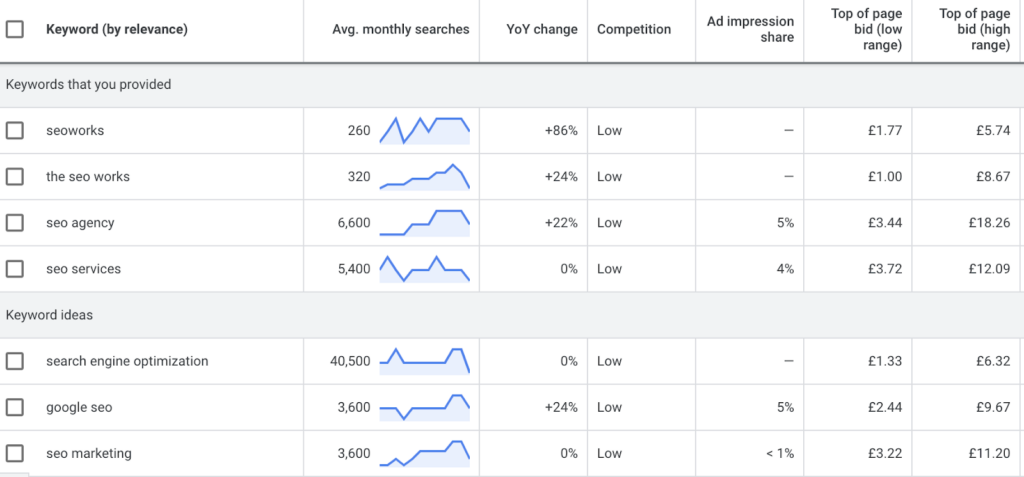
You can enter your domain to view keyword suggestions based on your whole site or a URL to look at an individual page. Using a competitor’s URL instead of your own is great for competitor research as you can gauge what they currently rank for and form ideas for your content strategy.
Ahrefs
Similarly, Ahrefs provides keyword volumes for search terms. You can also view the competition level marked as keyword difficulty (KD), global volume (GV), traffic potential (TP) and parent topic. Parent topic is useful for finding long-tail keywords. For example, the search phrase ‘SEO agency’ will provide you with terms under that parent topic such as ‘what to look for in an SEO agency’ that can help you rank for lower-difficulty keywords and create specific content for your audience.
Ahrefs will provide an ‘updated’ column that shows you the last time they checked the volume for that keyword. Select ‘Term match’ or ‘Phrase match’ to view keywords containing the terms you provided in any order, or to view data on terms containing your keywords in the same order you entered them in.
Ahrefs has a range of pricing plans, from Lite to Enterprise, allowing you to select the plan that best suits your budget.
Chrome extension: Keyword Surfer
If you’re a Chrome user, Keyword Surfer is a handy little plug-in that will show you basic statistics based on what you have searched. It’ll be added to your main SERPs page, meaning there’s no separate web page or login required to access it.
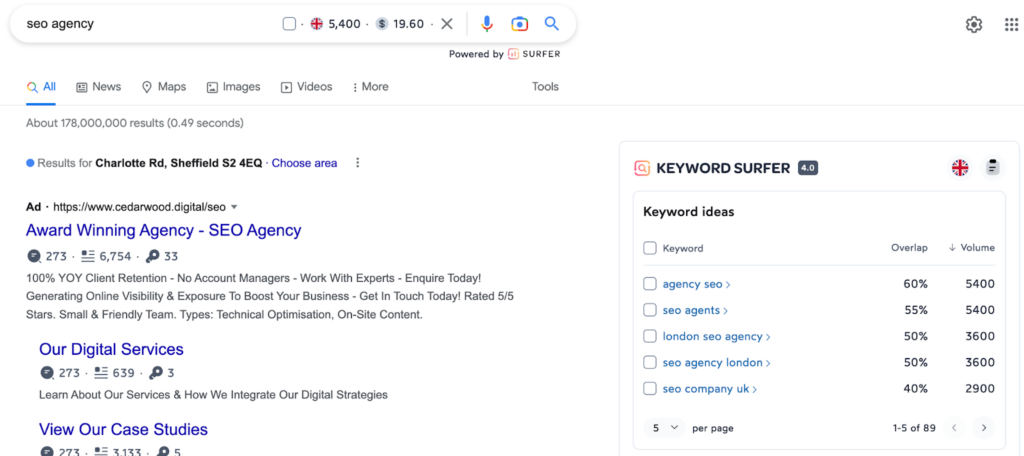
The keyword volume will show directly next to the search box, with a separate table to the right showing related keyword ideas with volumes for each term.
SemRush
SemRush offers a wide range of SEO insights, including keyword research. The Keyword Magic tool will list thousands of keywords related to the term you provided, with search volumes separated into topical groups and subgroups.
Topical groups indicate the relevance to search engines and show keywords that provide go-to authority. Subgroups show long-tail keywords for more thorough keyword research. You can also exclude certain terms such as ‘free’ or ‘best’ to filter out results that you’re not interested in targeting.
KWFinder
KWFinder lets you search by keyword or domain. When searching by keyword, results will show you the volume and questions related to the terms provided. It can also suggest possible competitors for you to analyse. When searching by domain, it’ll give you a list of keywords and their current ranking, allowing you to see what your site already ranks for, and keywords you might want to improve. Searching by domain will also give you trends of the search volume in the last 12 months.
Other features of KWFinder include estimated visits (EV), the cost per click (CPC), PPC competition and keyword difficulty (KD). KWFinder is free to try with an account, or there are various pricing plans to choose from.
Moz Keyword Explorer
Moz is a highly trusted SEO tool that can be used as a free, limited plan or as a premium, paid, subscription. The Keyword Explorer feature allows users to view current keyword trends and view what keywords your site, and its competitors, currently rank for. The main features of Keyword Explorer include viewing the monthly volume, difficulty, organic click-through rate (CTR) and priority.
Priority combines all of the data to create a score that you can use to effectively prioritise your keywords. The suggestions are ordered by relevance. Relevancy is worked out by how often the keyword comes up in SERPs when entering the terms that you provided.
Another great feature of Keyword Explorer is the Ranking Distribution graph. This shows you the keywords, when searching by URL, that your site ranks for. For example, you may have 2k keywords that are ranking in positions 1-3.

UberSuggest
UberSuggest is a tool created by Neil Patel. Search by keyword or domain and select the country you want to view keyword volumes for. When searching by keyword, the results will produce data including search volume, SEO difficulty, paid difficulty and cost per click (CPC). SEO difficulty indicates the estimated competition in the SERPs, the higher the number the harder it is to rank for that term. Paid difficulty refers to the estimated competition in paid search. You’re able to do a basic search with no account, or you can upgrade to view historical data to analyse the trends over a period of time.
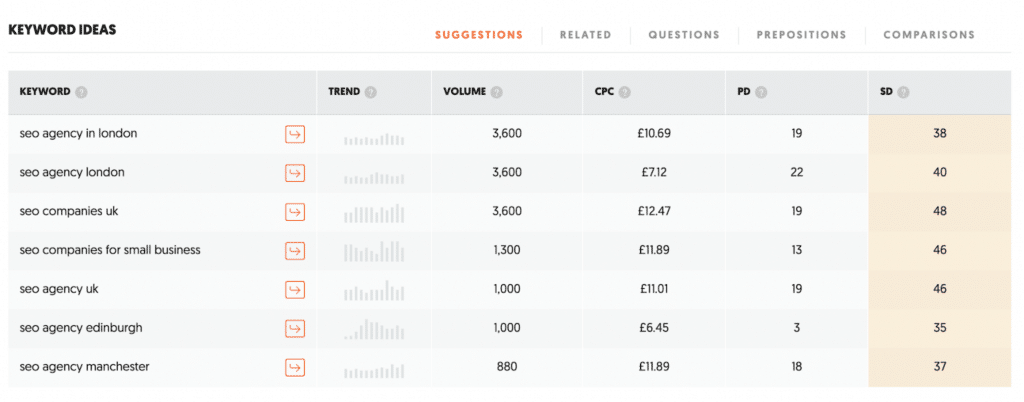
UberSuggest also gives you a table of content ideas. The table displays URLs that show up in the SERPs for given keywords, the estimated traffic and the number of backlinks to that site. This is great for planning your content strategy and seeing what competitors are doing.
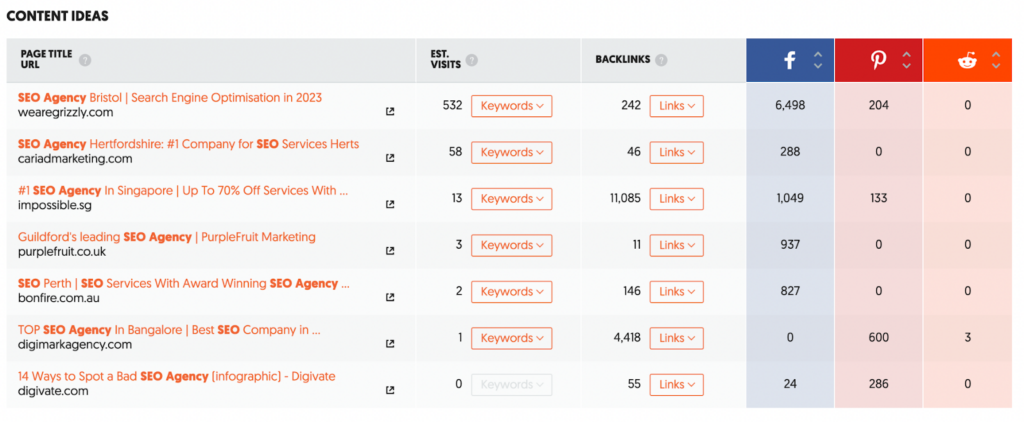
With an account, you’re able to add keywords to a list, this is useful for organising keywords into types such as informational and transactional.
SEO Site Auditing
Why are SEO site audits important?
Website audits are crucial for understanding the current status of your website. They can measure the visibility and usability of a site and help you work out how to improve your ranking, leading to online growth.
Sitebulb
Sitebulb is a tool that provides detailed insights into the performance of a site. It requires you to set up a project using the site’s domain that is then crawled and audited, producing a wide range of reports and a list of issues labelled as ‘hints’. Some examples of these hints include ‘Pages with duplicate titles’ and ‘<h1> length too short’.
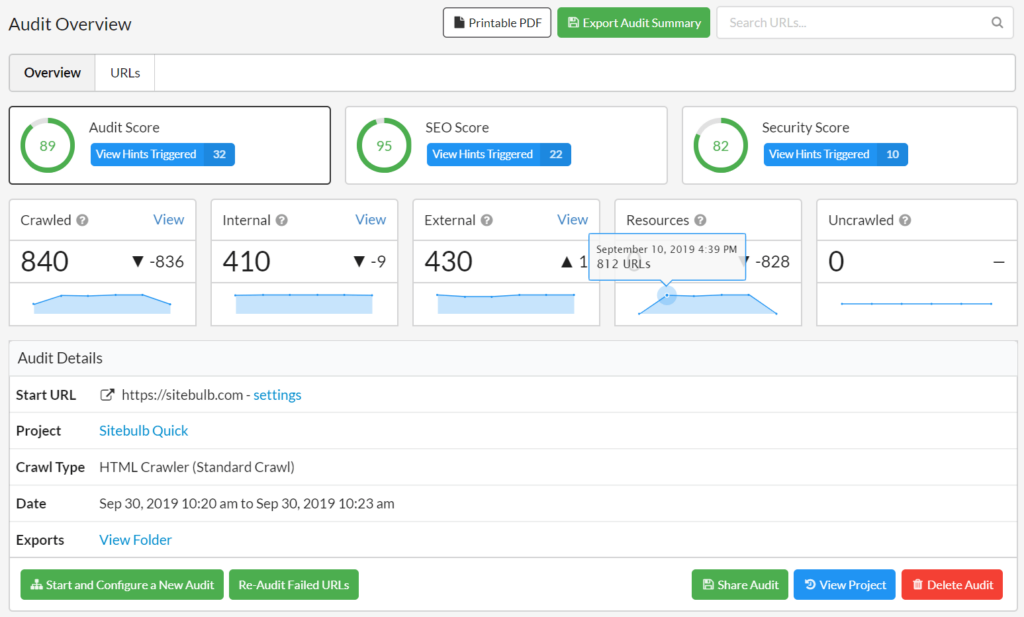
(from Sitebulb website)
Sitebulb’s hints are ordered by priority, meaning you’re left with a ready-made checklist that you can export into Excel or Google Sheets. The hints also show what URLs are affected so you can pinpoint the issues that reflect in your SEO score. Each hint is explained, providing a clear understanding of what the issue is, why it’s important and how you can resolve it.
You’re also able to download reports as PDFs, allowing you to present these findings to your clients in an easily understood and presentable format. Another handy feature of Sitebulb is the ability to compare previous audits, meaning you can monitor and track your progress. You can try Sitebulb for free before purchasing a membership.
Screaming Frog
Screaming Frog SEO tool crawls your domain and finds issues that could be lowering your SEO score. It highlights instances of broken links, redirect chains, metadata issues, review robots.txt and pages that are noindexed. The free version allows you to crawl up to 500 URLs, making it ideal for small sites. The paid version has unlimited URL crawls and includes more features such as finding near duplicate content, analysing structured data, conducting spelling and grammar checks and integrating with Google Analytics, Search Console and Page Speed Insights. You can also generate sitemaps that can be uploaded via Google Search Console.

Technical Issues
What technical issues can impact SEO?
Technical issues can impact your SEO score, and therefore the position your site ranks at. These include mobile usability issues, duplicate content, poor navigation, uncompressed images, slow page load speed, lack of or incorrect structured data and URLs with special characters or capital letters. This is why it’s important to analyse the technical aspect of your site as well as the quality of content using tools.
Google Search Console
Google Search Console is widely used to view the indexing and performance of your site, it can give you an overview of how your site looks in Google SERPs. Once you have set up your account, you can look into the four metrics of your website. These are total clicks – how many people clicked onto your website from the search results, total impressions – how many times your site appeared in search results, average click-through rate and average position in the SERPs. You can view any pages that have indexing issues, decide whether these are correctly noindexed and submit to Google for indexing directly from GSC.
Google Search Console allows you to look at your site as a whole, as well as having a URL inspection feature to analyse individual pages. You can view the top-performing pages including the clicks and impressions.
GSC has a query feature that displays the top search queries that resulted in traffic to your site, allowing you to optimise and target pages for keywords accordingly.
Page Speed Insights
Page Speed Insights (PSI) is an efficient tool that can show you the performance of your site-based features such as page speed. You can view both the performance score on mobile and desktop and whether your site has passed the Core Web Vitals Assessment.
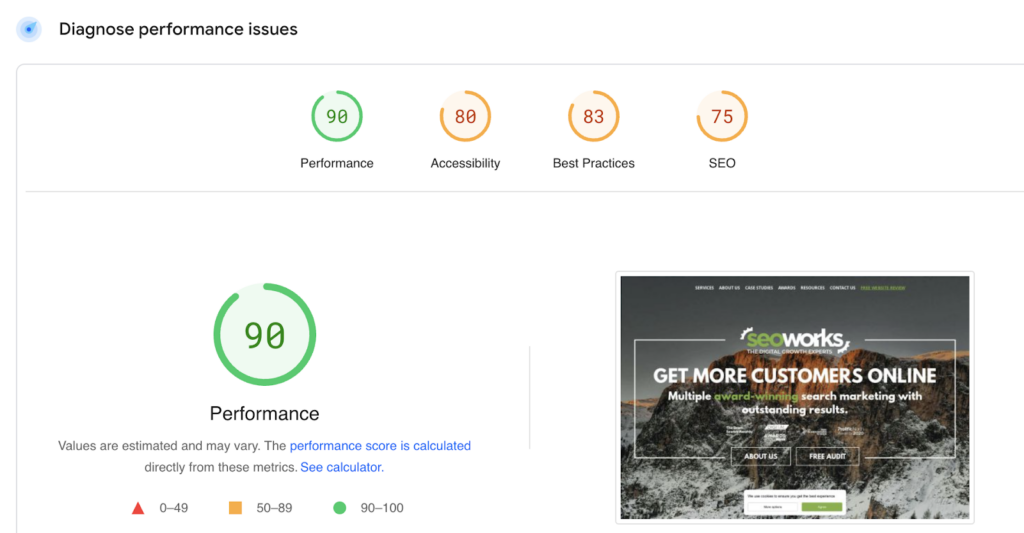
PSI will generate a report showing opportunities on how you can improve your performance score such as reducing unused CSS, reducing JavaScript and optimising image formats. You’ll also get to see metrics including Largest Contentful Paint, First Input Delay and Cumulative Layout Shift.
Blog Writing
Why you should use tools to aid blog writing
The keyword research mentioned above is crucial when writing blogs. Targeting the right keywords that are relevant to your site and its offerings help users find the information they are looking for and allows your site to rank for these key terms. Specific tools can help you discover exactly what people are searching for.
Answer The Public
Answer The Public allows you to search by topic, brand or product in any country. Results show popular search phrases and query ideas.
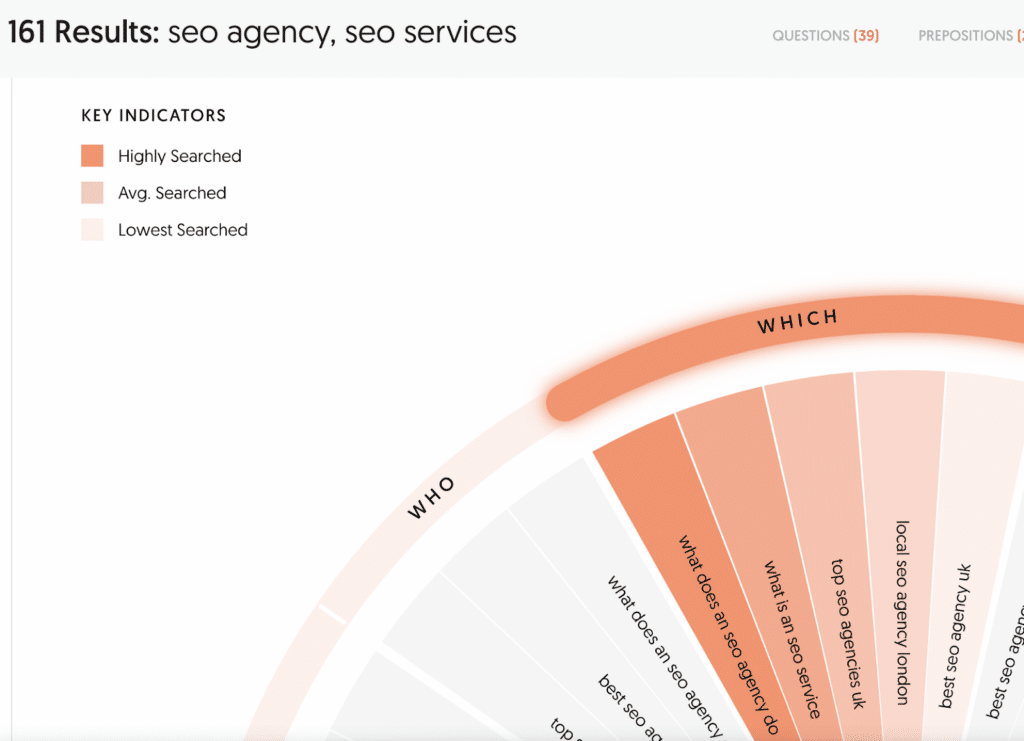
As well as questions, Answer The Public displays prepositions such as ‘seo agency cambridge’, comparisons and related terms. Without an account, you can search once a day, with a free account you can use 3 searches per day.
Frase.io
Frase uses AI technology to help you write and optimise content for SEO. They offer a solo, basic and team membership plan depending on the number of times you intend to use it. You can also use Frase to create article briefs and generate content ideas. It’s important to note that professional content writers shouldn’t heavily rely on Frase, but use it as a guide rather than letting it do the work for you. Research and expert SEO knowledge still work better than an AI tool.
Grammarly
Grammarly acts as a writing assistant, it reviews grammar issues including spelling and scans for plagiarism. It can also identify poorly written sentences and rewrite them for clarity. You can write directly into the website platform or upload an existing document.
Additionally, you can implement Grammarly in Google Docs for real-time grammar and sentence structure suggestions. Create a free account for basic suggestions, or go premium for advanced formatting and complex sentences.


Conclusion
Using these tools can help you form ideas for creating engaging content, see what people are searching for and discover issues within your site that can be harming your SEO score and its performance. SEO experts use these to make tasks more efficient, however, above everything else we use our extensive years of experience and expert knowledge to create successful campaigns.
If you’re looking for a specialist SEO agency with Award-Winning results to boost your traffic, contact the SEO Works team for more information and to see why we’ve been voted as a top SEO service provider by industry leaders.

Melanie is an SEO Account Manager with a background in digital media management. She is passionate about writing content, organising projects and building client communications.

